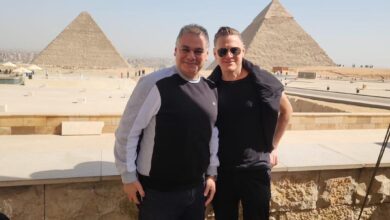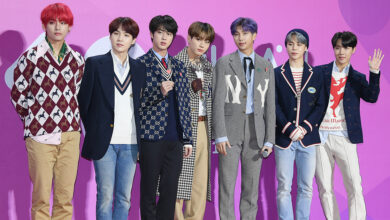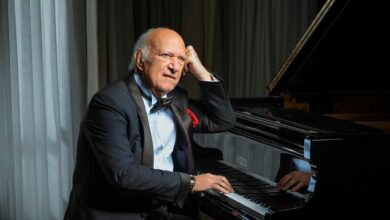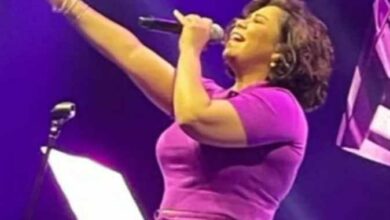In terms of non-violent protest, few things can be as emotionally engaging as music, a fact clearly reflected in the teary-eyed audience members at the "Microphone for Alex" benefit concert, held last night at Zamalek’s Sawy Cultural Center in honor of the victims of Alexandria’s tragic New Year’s church bombing.
The concert—originally scheduled to take place over two days before Sunday’s Alexandria performances were canceled at the last minute due to ever-present security “concerns”—was organized by Egyptian actor Khaled Aboul Naga, star of the award-winning Egyptian film “Microphone,” which featured many of the night’s performers.
Taking the stage, Aboul Naga began the night by reminding the audience—not that they needed to be reminded—of the cause behind the event and the importance of solidarity, particularly in the face of sinister and destructive forces. A brief moment of silence followed, during which images of those who lost their lives in the terrorist attack were projected onto an onstage screen. Organizers drifted through the crowds, handing out Egyptian flags as well as badges and bumper stickers displaying the image of a united crescent and cross.
Rock quintet Massar Egbari proved to be a good choice for the night’s opening act, as their unique blend of Arabic lyrics and Western rock sensibilities—a difficult combination with frequently disastrous results—provided an invigorating burst of energy that seemed to immediately electrify the previously solemn audience members. The band’s performance was particularly well aided by their strong beats and lead singer’s impressive vocal skills.
Throughout their set, Massar Egbari were accompanied onstage by several guest musicians, including Hany Adel from “underground” breakouts Wust el-Balad, and accomplished accordionist Wael el-Sayed. Most audience members would undoubtedly agree, however, that the highlight of Massar Egbari’s performance—and arguably, the night—was found in “The Sad Eyes of Egypt,” a mournful ballad on the devastating power of religious intolerance which brought tears to the eyes of several attendees.
A drastic change of tone came with the following act, young hip-hop outfit Y Crew; the seven members of which stormed the stage with their official concert t-shirts—bearing a variation of the cross-and-crescent theme—wrapped tightly around their heads. After a chaotic collaboration with Massar Egbari, the group was left to dominate the stage with their boisterous rapping, excessive arm waving, occasional English swear, and break-dancing. One song, which sampled Dalida’s immortal “Helwa Ya Baladi” seemed to resonate the most with audience members, inspiring a great deal of flag waving and cheering.
The night’s featured acts also included performances by Arabic rock ensemble Sout Fel Zahma, supergroup Ana Masry (with 14 members), the popular Wust el-Balad, and the comparatively quieter Puzzle trio, whose smoky sound provided a welcome break from the night’s mostly over-energetic (and somewhat chaotic) acts. By this point, however, the audience had become a little restless, and Puzzle’s efforts seemed to be mostly in vain—unfortunate since their music stood out as being the most original in a lineup consisting mainly of fusion acts and hip-hop.
Solo artist Shady al-Garf also contributed to the event, performing a song featured in the film. Although visibly nervous, the young musician—accompanied on this occasion by a bassist—succeeded in connecting with the audience.
In between acts, organizer and host Aboul Naga was joined by several celebrities, including his “Microphone” co-star, Yousra el-Lozy, actress Basma, and acclaimed director Yousry Nasrallah, who encouraged the audience to repeat his chant: “We are many, and we are not scared!” Basma and el-Lozy’s short statements were less assuming—and seemed more genuine for it—as was a short poem written and read by actress Hana Shiha.
The night also featured a word from presumed presidential candidate Mohamed ElBaradei—although, as usual, the man himself was nowhere to be seen. In an email read out to the audience by an unnamed assistant, ElBaradei expressed his support for the cause, concern over the infectious power of religious intolerance, and the danger of submission to tyranny. For the most part, the perpetually absent instigator’s words fell flat, prompting one audience member to shout out, “Where the hell is he?”–a question which, unfortunately, went unanswered.
The night’s most poignant moment came when Aboul Naga introduced Mama Leila, whom he referred to as the “mother of all Egyptians,” but can be more accurately described as the mother of Khaled Saeed, the young Alexandrian allegedly beaten to death by two undercover police officers in June of 2010. As the lengthy applause died down, the mourning mother quietly blamed her son’s death on “the system, torture, and the never-ending emergency law,” adding her undying hope that “any Egyptian who has suffered the loss of a [loved one] will, one day, see justice prevail, and their rights restored.”
In spite of the previous day’s cancellation, Monday night’s event was considered a success by most attendees and performers. As Hossam Ghalib, Puzzle’s bassist and frontman explained afterward, “This type of stuff makes a difference: it’s not just about music, and it’s more than just a concert.”
“Incidents like the Alexandria church bombing can either bring people together, or tear them apart,” said the 31-year-old musician. “And it’s important to do all we can to make sure we avoid the latter.”
Proceeds from the concert’s ticket and merchandise sales go to the victims’ families.




